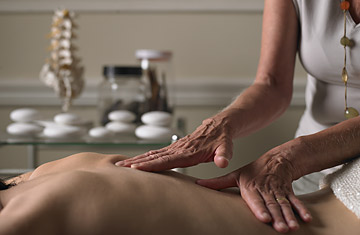
I'm not a big fan of massages. As a neurosurgeon, I've never been completely convinced that the science behind them is all that sound. Yet there's no denying that they're popular — particularly among baby boomers and others who try to get active and stay fit with bodies that seem to grow achier all the time. But increasingly, research is showing that all those boomers may be onto something — that there are solid reasons for just about everyone to consider getting a good rubdown.
Investigators at the University of Colorado Denver School of Medicine recently took a close look at the effect of massage on a very specific group of people who might be most in need of pampering: cancer patients. In a study of 380 adults with advanced-stage cancer and at least moderate pain, the researchers found that those who received massage therapy had greater improvement in pain and mood than patients who were touched in a manner similar to massage but without the precise motion and pressure a trained therapist uses.
For these patients, even a little relief can mean a lot. Generally, about a third of cancer patients experience significant pain. As for mood, according to the National Cancer Institute, 15% to 25% of cancer patients become clinically depressed at some point during their illness. And the very nature of treatment for a serious illness often makes things worse.
"When you're ill, you don't necessarily get the kind of human contact we do in our daily lives," says end-of-life-care physician Dr. Jean Kutner, who was the lead author of the study. "Most of the touch you receive is related to procedures, such as getting chemo or having blood drawn."
David Mejia is a 39-year-old former systems engineer in Colorado who was found to have multiple myeloma. He recalls falling into a deep depression during treatments. "I didn't want to talk to anybody," he says. "The phone would ring, but I didn't want to pick it up." Mejia describes the massage therapy he received to relieve tightness in his joints as also a form of treatment for his depression. "It doesn't just make my body feel good —it makes my spirit feel good," he says.
The overlap of mental and physical boosts makes sense, given the biochemistry that's in play when your body is massaged. Levels of feel-good neurotransmitters such as serotonin and dopamine spike, while measures of the stress hormone cortisol drop. This is the same phenomenon that's at work when you feel the fabled runner's or exerciser's high, and it's also one of the things that makes a post-workout massage particularly satisfying. For people whose workouts lead to neck and back pain — or whose existing neck and back pain prevent them from exercising at all — massage has answers too.
It has been fairly well documented that massage therapy provided by a licensed or certified professional produces real relief that may last even months. Several studies have shown that a rubdown works well at the other end of the age spectrum too: babies and infants who are massaged tend to cry less, appear more relaxed and interact better with their mothers.
As my homework for this column, I gave in and had a massage. I am not sure if it was the boost in neuro-transmitters or just the relief of some pretty sore muscles, but I suspect I'll be coming back for more.
With reporting by Shahreen Abedin / New York
